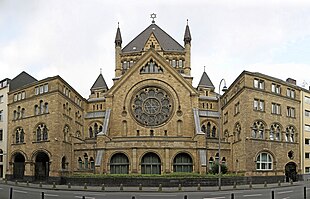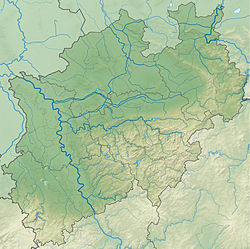Roonstrasse Synagogue
| Roonstrasse Synagogue | |
|---|---|
German: Synagoge Roonstraße | |
 The synagogue in 2006 | |
| Religion | |
| Affiliation | Orthodox Judaism |
| Rite | Nusach Ashkenaz |
| Ecclesiastical or organisational status | Synagogue |
| Leadership | Rabbi Yaron Engelmayer |
| Status | Active |
| Location | |
| Location | 50 Roonstraße, Cologne, North Rhine-Westphalia |
| Country | Germany |
Location of the synagogue in North Rhine-Westphalia | |
| Geographic coordinates | 50°55′55″N 6°56′11″E / 50.93194°N 6.93639°E |
| Architecture | |
| Architect(s) |
|
| Type | Synagogue architecture |
| Style | Romanesque Revival |
| Date established | 1798 (as a congregation) |
| Completed |
|
| Destroyed | November 9, 1938 (on Kristallnacht; partial) |
| Dome(s) | One |
| Website | |
| synagoge-koeln | |
| [1] | |
Roonstrasse Synagogue (German: Synagoge Roonstraße) is an Orthodox Jewish congregation and synagogue, located at 50 Roonstraße in Cologne, Germany. The synagogue is the only surviving of the five synagogues of Cologne before the Nazi era.
History
[edit]The Jewish community in Cologne has the longest history in Germany, being first mentioned in 321. Expelled in 1424, the Jews did not return to Cologne until 1798. In 1815 the community numbered 150, growing to 8000 in 1895, and 18,281 by 1933,[2] the largest in Germany after Berlin.[3]
First synagogue
[edit]The foundation stone of the Romanesque Revival style building, designed by Cologne architects Schreiterer & Below, was laid on October 23, 1895, and the inauguration took place on March 22, 1899. Like all the other synagogues on the city it was attacked and set alight on November 9, 1938, during Kristallnacht. It was further damaged during World War II, when the front portion was completely destroyed leaving only the burnt out tower and central section.[4]
Rebuilt synagogue
[edit]Returned to the surviving Jewish community in 1945, in the late 1950s they decided to completely rebuild, as it was the only one not completely destroyed. The reconstruction was under the direction of the architect Helmut Goldschmidt, with minor changes on the outside and a simplified interior (with new leadlight windows by Lammers & Warzager), and was reopened on September 20, 1959. On Christmas Eve of that year, the synagogue was smeared with anti-Jewish slogans by members of the far-right Deutsche Reichspartei. West German Chancellor Konrad Adenauer, who had been mayor of Cologne from 1917 until removed by the Nazi government in 1933, made the desecration the subject in his New Year's speech. Since then it has been center of Jewish community of Cologne, and consists of a community center, a small display of items associated with Cologne Jewry, and a kosher restaurant. The interior of the reconstructed synagogue has a vast blue dome.
On August 19, 2005, Pope Benedict XVI visited Roonstrasse Synagogue. This visit was the second ever visit to any synagogue by any of the Popes.[5] There, he condemned Nazism and antisemitism.[6]
Gallery
[edit]-
Postcard dated 1903
-
Postcard dated 1907
-
Interior in 1899
-
April 2006
-
Interior of the synagogue
See also
[edit]- History of the Jews in Cologne
- Koln Synagogue (in German)
- List of synagogues in Germany (in German)
References
[edit]- ^ "Synagogue at 50 Roonstraße in Köln". Historic synagogs of Europe. Foundation for Jewish Heritage and the Center for Jewish Art at the Hebrew University of Jerusalem. n.d. Retrieved June 22, 2024.
- ^ "Synagogen-Gemeinde Köln", Wikipedia (in German), July 16, 2019, retrieved February 3, 2020[self-published source?]
- ^ "Germany: Jewish Population in 1933". encyclopedia.ushmm.org. Retrieved February 3, 2020.
- ^ "Ruins of the Ronnstrasse Synagogue, Cologne, Germany". dbs.dh.org. Israel. November 1938. Archived from the original (Image) on February 3, 2020.
- ^ Berman, Lazar (January 6, 2023). "Despite some missteps, Benedict XVI was a committed friend to the Jews". The Times of Israel.
- ^ McHugh, David (August 19, 2005). "Pope Warns of Increase in Anti-Semitism". WorldWide Religious News.
External links
[edit]- Official website (in German)
- "Passover". Time Magazine. April 9, 1945. Archived from the original on March 20, 2005.
- 1798 establishments in the Holy Roman Empire
- 19th-century synagogues in Germany
- 20th-century attacks on Jewish institutions
- 20th-century synagogues in Germany
- Ashkenazi Jewish culture in Germany
- Ashkenazi synagogues
- Innenstadt, Cologne
- Jewish organizations established in 1798
- Orthodox synagogues in Germany
- Rebuilt synagogues
- Synagogue buildings with domes
- Synagogues completed in 1899
- Synagogues completed in 1959
- Synagogues destroyed during Kristallnacht (Germany)
- Synagogues in Cologne
- European synagogue stubs
- German religious building and structure stubs
- North Rhine-Westphalia building and structure stubs






